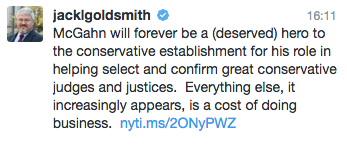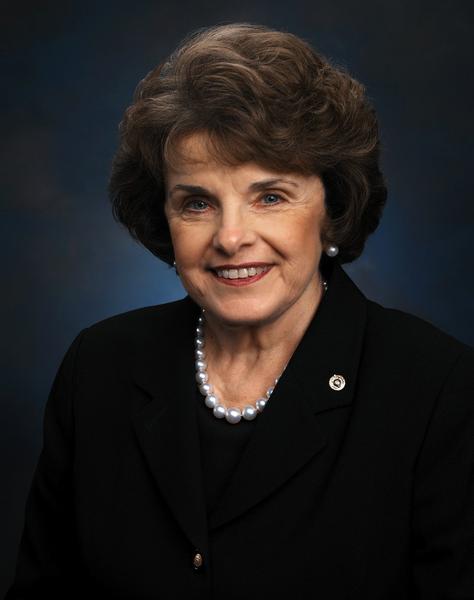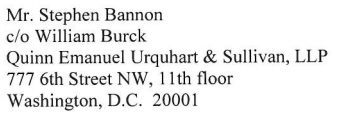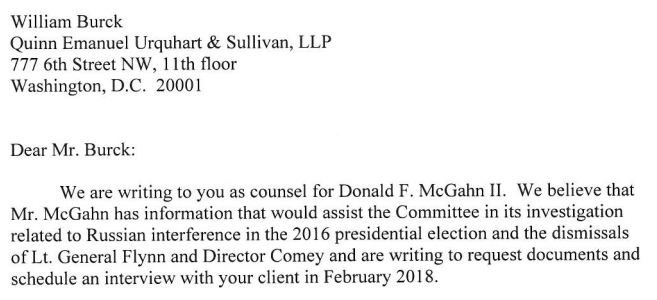Steve Bannon’s Bas-Relief Confession that Trump Told Him to Deny Discussing Sanction Relief
After a week of writing about Mike Flynn and more Mike Flynn, I’m finally getting around to the transcripts the House Intelligence Committee wrote last week. A bunch of frothy right wingers have pointed to the transcripts as PROOF OF NO COLLUSION, which is hilarious. I’ve barely begun reviewing them, but some glaring holes in the investigation include:
- The key players — Mike Flynn and Paul Manafort, but also Rick Gates — did not testify
- Two witnesses (Michael Cohen and Roger Stone) were convicted for the lies they told to the committee and a third (Erik Prince) is reportedly under investigation, even if Billy Barr’s DOJ doesn’t prosecute Trump flunkies
- Multiple witnesses (Michael Caputo, Steve Bannon, and Jared Kushner, for starters) denied knowing people or having evidence their Mueller materials show they had
Republicans mostly asked each witness, “did you collude?” which predictably elicited the “no” answers the frothers are now pointing to as PROOF. Democrats spent most of their time trying to get recalcitrant witnesses to answer questions they refused to answer rather than trying to corner them into something useful.
The investigation was a shit-show.
The craziest thing (thus far, anyway), is Steve Bannon’s two appearances. Bannon testified in January 2018 and invoked White House guidance to refuse to answer questions from both the transition and post-inauguration periods, periods others had addressed. He also claimed any communications of interest would have been turned over by the campaign, thereby hiding emails he had with Roger Stone using his personal email where they explicitly discussed Julian Assange.
When Bannon went back a month later, having consulted with Devin Nunes in the interim and after Nunes appears to have shared a transcript of Bannon’s first appearance with the White House, he provided the committee a bunch of questions he would answer — all “no” answers.
Here’s how just some of those questions parroted back (for the second time in the hearing) looked:
MR. CONAWAY: After November 8th, 2016, did you meet with Ambassador Kislyak?
MR. BANNON: No.
MR. CONAWAY: On March 27, 2017, The New York Times reported that in mid-December of 2016 Kushner met with Sergei Gorkov of the VEB. Were you aware of this meeting?
MR. BANNON: No.
MR. CONAWAY: Did you attend a December 2016 meeting with Kushner that Kushner had with Gorkov?
MR. BANNON: No.
MR. CONAWAY: Did Mr. Prince have any role in the current administration?
MR. BANNON: No.
MR. CONAWAY: Was there any discussion on January 27th, 2017, at the White House regarding Mr. Papadopoulos, who was contacted by the FBI that day?
MR. BANNON: No.
MR. CONAWAY: Has Mr. Papadopoulos had any contact with anyone at the White House concerning the fact that the FBI had approached him?
MR. BANNON: Not to my knowledge.
MR. CONAWAY: Was the fact that the FBI approached Mr. Papadopoulos on January 27th communicated to President Trump?
MR. BANNON: Not to my knowledge.
MR. CONAWAY: Did Mr. Trump ever discuss with you any conversations between Donald Trump Jr. and WikiLeaks after the election?
MR. BANNON: No.
MR. CONAWAY: Did you ever meet with Devin Nunes about the Russia investigation?
MR. BANNON: No.
MR. CONAWAY: While at the White House, were you ever instructed to take any action that you believe could hinder the Russian investigation in any way?
MR. BANNON: No.
MR. CONAWAY: Were you ever given any instruction at the White House that you felt might amount to an effort to obstruct justice?
MR. BANNON: No.
MR. CONAWAY: Did you have any conversations with Director Comey after the election about whether he would remain the head of the FBI?
MR. BANNON: No.
MR. CONAWAY: Once you were part of the administration, were you a part of any discussions about how to approach the Russian, vis-à-vis the sanctions, whether to do away with them or in any way minimize the effects of the sanctions?
MR. BANNON: No.
Here’s how Adam Schiff got Bannon to admit that he was literally reading from a script the White House gave him (remember that Bannon’s lawyer, William Burck, also represented White House Counsel Don McGahn).
MR. SCHIFF: Mr. Bannon, who wrote these questions?
[Discussion off the record.]
MR. BANNON: My understanding, Mr. Schiff, is that these came from the transcript.
MR. SCHIFF: No, no, no. The questions that Mr. Conaway just asked you the questions. I asked you earlier if you had been authorized by the White House to answer all in the negative. Who wrote these questions?
MR. BANNON: Same answer.
MR. SCHIFF: What’s the same answer? Who wrote the questions?
MR. BANNON: My understanding is they came from the transcript.
MR. SCHIFF: What transcript are you talking about?
MR. BANNON: This transcript of my first interview.
[snip]
MR. SCHIFF: Well, how were they produced? How do you know that the White House has authorized you to answer them? [Discussion off the record.]
MR. BANNON: My counsel informed me that these were the questions the White House authorized me to answer.
MR. SCHIFF: But you didn’t write these questions?
MR. BANNON: No.
MR. SCHIFF: And your counsel didn’t write these questions?
MR. BANNON: No.
MR. SCHIFF: So these questions were supplied to you by the White House?
[Discussion off the record.]
MR. BANNON: As far as I know.
The thing is, most of these are now recognizably misdirection from some known damning detail. For example, Bannon did not attend the November 30, 2016 meeting with Sergey Kislyak at Trump Tower, but he was invited. Bannon’s lack of knowledge of Jared Kushner’s December meeting with Sergei Gorkov doesn’t make the meeting itself less damning — arguably, it suggests Kushner kept it on a close hold — and it doesn’t rule out Bannon being involved in a meeting with Gorkov sometime after that. Bannon’s narrow denial that Erik Prince had a role in the administration distracts from Prince’s role as a go-between with Russia during the transition, something Bannon was personally involved with (and covered up by deleting his relevant text messages). There was a discussion among senior campaign officials of the link that WikiLeaks sent Don Jr in September 2016, but it was during the election, not after it. Bannon didn’t have conversations with Jim Comey about firing him, but he had a ton of conversations about firing Comey, eight times on May 3 and 4, 2017 alone. Even the questions about obstruction of justice are consistent with explicit requests that Bannon obstruct, but that took place somewhere else, like Mar-a-Lago or Bedminster (and it’s notable that Bannon’s initial testimony dramatically backed off some of the claims Bannon made to Michael Wolff that had just been published in Fire and Fury).
As Adam Schiff begins to figure out what happened, he asks questions that make it clear that Bannon did not meet — in person — with Nunes, but did speak to him on the phone.
MR. SCHIFF: Now, I see there’s a question on here, did you ever meet with Devin Nunes about the Russia investigation, and you’ve answered that “no.” But you’ve also answered, when my colleague asked you, that you have discussed — you had discussions with Mr. Nunes and you refused to answer the question about whether it was about the Russian investigation. Is that correct?
[Discussion off the record.]
MR. BANNON: However I answered, it’s in the transcript.
MR. SCHIFF: Let me just ask you again. Did you ever meet with Devin Nunes about the Russian investigation?
MR. BANNON: No.
MR. SCHIFF: Did you ever discuss the Russia investigation with Devin Nunes?
[Discussion off the record.]
MR. BANNON: That’s not a question I’m authorized to answer.
Even before that, Schiff cops on to Bannon’s denial about something — whether George Papadopoulos alerted the White House after he was first questioned about the FBI — that Bannon knows nothing about.
MR. SCHIFF: So one of the questions that you were supplied by the White House was, has Mr. Papadopoulos had any contact with anyone at the White House concerning the fact that he had been — that the FBI had approached him? How do you know the answer to that, Mr. Bannon?
[Discussion off the record.]
MR. BANNON: Can you just ask the question again?
MR. SCHIFF: Yes. One of the questions that the White House gave you to answer to our committee was, has Mr. Papadopoulos had any contact with anyone at the White House concerning the fact that the FBI had approached him?
MR. BANNON: I think I said, “Not to my knowledge.”
MR. SCHIFF: So you really did don’t know, do you?
MR. BANNON: That’s — not to my knowledge.
MR. SCHIFF: Why did the White House propose a question to you that you couldn’t answer within your knowledge?
[Discussion off the record.]
MR. BANNON: You have to ask the White House that.
In Papadopoulos’ Congressional testimony (which took place in October 2018, so six months after Bannon’s second HPSCI interview), the coffee boy would admit that he emailed Marc Kasowitz, who was then Trump’s personal attorney, sometime after his FBI interview.
Q And you didn’t talk to anyone from the Trump organization about that interview with the FBI?
A I don’t think I did, no.
Q So you were interviewed again by the FBI —
A I can’t remember if I reached out to Marc Kasowitz about either that or my subpoena from the Senate. And I emailed him and I said, Look, would you be interested in representing me? I think that’s what happened. But I don’t — I can’t remember exactly why I emailed him, but I think I emailed Marc Kasowitz’ firm sometimes after the interview, but I don’t remember if he ever responded or anything like that.
This post writes up what we know about Papadopoulos’ testimony.
This makes it clear, then, that the script Bannon was given was a ham-handed attempt to get a bunch of denials in the record, denials of things that actually did happen.
Among the questions the White House included was one designed to get him to deny he had discussed eliminating sanctions on Russia.
MR. CONAWAY: Once you were part of the administration, were you a part of any discussions about how to approach the Russian, vis-à-vis the sanctions, whether to do away with them or in any way minimize the effects of the sanctions?
MR. BANNON: No.
Of course, this “no” answer only says Bannon didn’t continue to discuss ending sanctions on Russia after inauguration, but he did beforehand.
There is testimony on the Mueller Report about Bannon’s personal involvement in discussions about the Russian sanctions imposed on December 28, 2016. But Bannon — in testimony on February 12, 2018, so three days before he read this script before HPSCI — claimed to have forgotten those conversations.
Shortly thereafter, McFarland and Bannon discussed the sanctions. 1235 According to McFarland, Bannon remarked that the sanctions would hurt their ability to have good relations with Russia, and that Russian escalation would make things more difficult. 1236 McFarland believed she told Bannon that Flynn was scheduled to talk to Kislyak later that night. 1237
[snip]
In addition to her conversations with Bannon and Reince Priebus, at 4:43 p.m., McFarland sent an email to Transition Team members about the sanctions, informing the group that “Gen [F]lynn is talking to russian ambassador this evening.” 1251 Less than an hour later, McFarland briefed President-Elect Trump. Bannon, Priebus, Sean Spicer, and other Transition Team members were present. 1252
[snip]
Flynn recalled discussing the sanctions with Bannon the next day and that Bannon appeared to know about Flynn’s conversation with Kislyak. 1274 Bannon, for his part, recalled meeting with Flynn that day, but said that he did not remember discussing sanctions with him. 1275
[snip]
Flynn recalled discussing the sanctions issue with incoming Administration official Stephen Bannon the next day. 100 Flynn said that Bannon appeared to know about Flynn’s conversations with Kislyak, and he and Bannon agreed that they had “stopped the train on Russia’s response” to the sanctions. 101
1275 Bannon 2/12/18 302, at 9.
101 Flynn 1/19/18 302, at 4-5. Bannon recalled meeting with Flynn that day, but said he did not remember discussing sanctions with him. Bannon 2/12/18 302, at 9.
The White House gave Bannon a script, telling him to deny his involvement in reaching out to Russia on sanctions. And the specific form of the question — which asks about doing away with them — suggests those conversations on December 28, 2016 went further than the Mueller Report describes.
Which explains why Trump is trying to ensure Flynn avoids prison time for hiding that detail.






